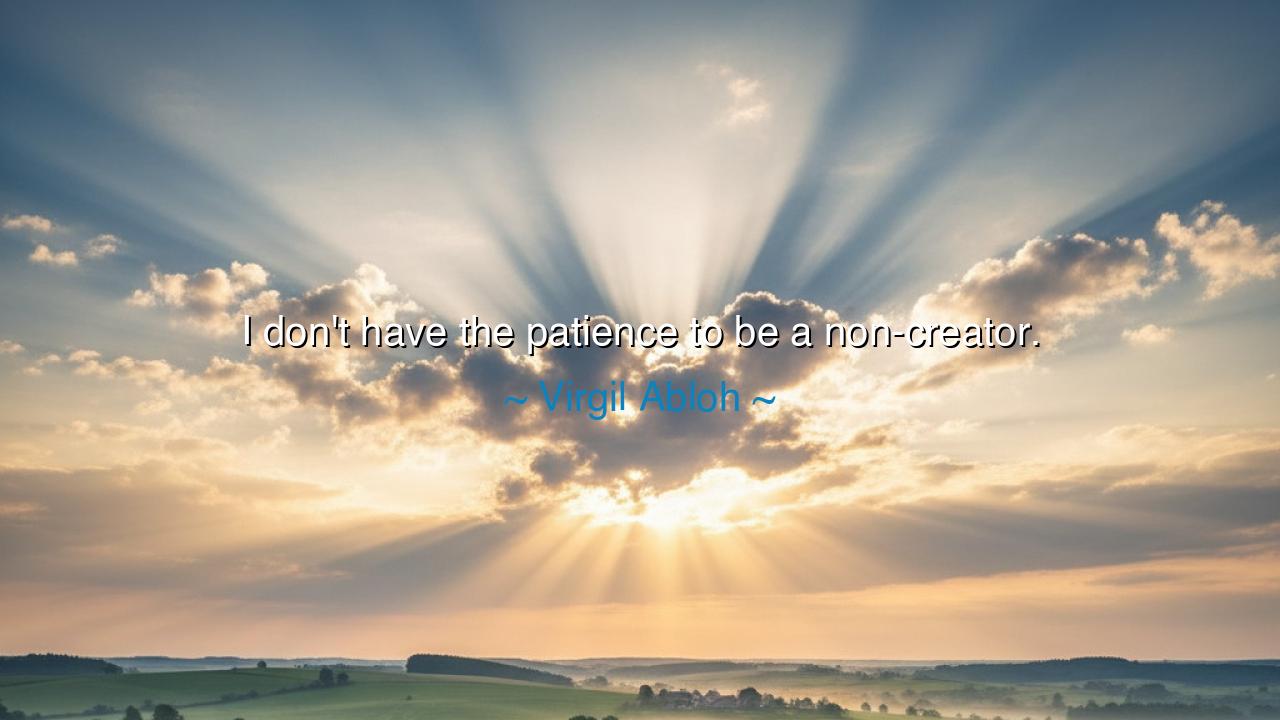
I don't have the patience to be a non-creator.






Hear now the words of Virgil Abloh, visionary and maker of worlds: “I don’t have the patience to be a non-creator.” In this short and powerful utterance, Abloh unveils the restless heart of the artist. For in him, and in all who share this fire, there dwells a force that cannot be silenced, a hunger that cannot be stilled by idle waiting. To be a non-creator is, for such souls, to be exiled from their very essence. Creation is not a pastime for them—it is breath, it is pulse, it is the very proof of life.
When he speaks of lacking patience, he does not confess weakness, but strength of calling. For what he reveals is that time cannot be wasted in stillness when the spirit burns with ideas. The potter cannot look upon clay without yearning to shape it. The writer cannot glance at silence without hearing the song of words. The designer cannot see a blank page without envisioning a universe within it. To demand of such a soul that they be a non-creator is like demanding a bird to walk the earth forever without spreading its wings.
The truth Abloh declares has always lived in the hearts of the great. Think of Leonardo da Vinci, who sketched inventions beyond the reach of his own century because he could not abide to see the world without imagining more. He had no patience for passivity, no willingness to simply observe when he might instead create. Or recall Beethoven, who even as deafness consumed him, still composed symphonies that echoed across eternity. Neither man could be a non-creator; to cease creating would have been to cease living.
There is, too, a heroic defiance in this saying. For to refuse the state of non-creation is to resist the stagnation that swallows so many lives. The world often lulls people into consumption—watching, waiting, receiving—yet those who heed Abloh’s spirit rise against this tide. They make, they shape, they add something new where there was nothing before. Their legacy is not measured in what they took, but in what they gave.
The origin of such fire lies deep within the nature of humanity itself. Since the dawn of ages, mankind has created to survive and to flourish: the first stone tool, the first painted wall of a cave, the first hymn sung to the stars. To be a creator is to participate in that eternal current of human destiny. To refuse creation is to turn away from the very gift that distinguishes humanity from dust. Abloh’s words remind us that to create is not luxury, but calling.
So what lesson shall we carry from this? It is this: if you feel the stirrings of imagination within you, do not bury them beneath the soil of hesitation. Do not wait for perfect conditions, for endless approval, or for permission. Begin where you are, with what you have, and honor the flame that refuses to be still. For every act of creation, however small, is a defiance against emptiness, a declaration that life is not meant to be endured in silence, but expressed in beauty, in vision, in boldness.
Practical action is clear: write, even if no one reads. Build, even if no one applauds. Paint, even if no one buys. Fashion your world, even if the crowd does not yet understand. For in creating, you do not simply make objects—you make yourself. You shape your own soul, giving it form and meaning that cannot be taken away.
Thus, Virgil Abloh’s words become not merely a confession of his own restless genius, but a torch for all generations: do not waste your life as a non-creator. The world already has enough silence, enough emptiness, enough repetition. What it needs is your voice, your vision, your mark upon the fabric of time. To live is to create; to create is to live. Do not be patient with stillness—be urgent with creation.






AAdministratorAdministrator
Welcome, honored guests. Please leave a comment, we will respond soon